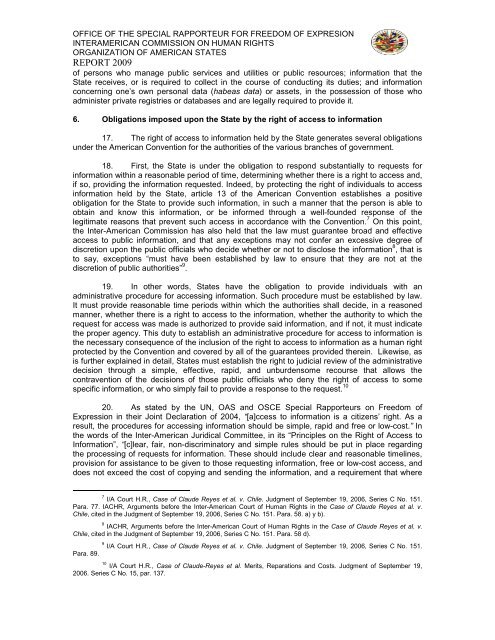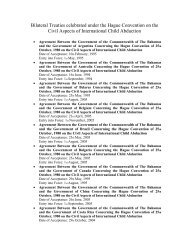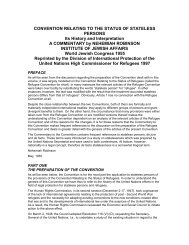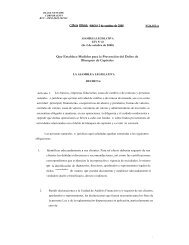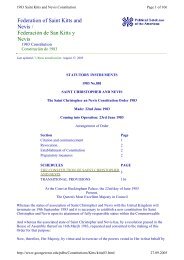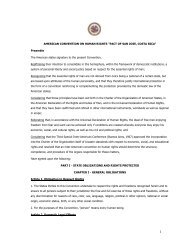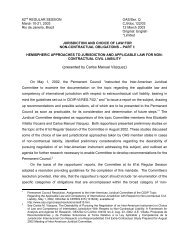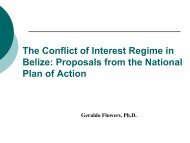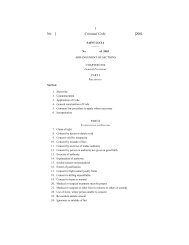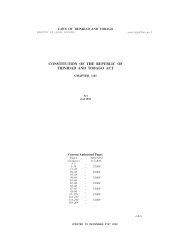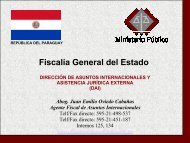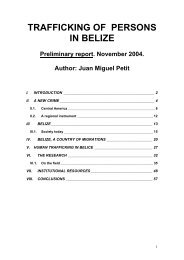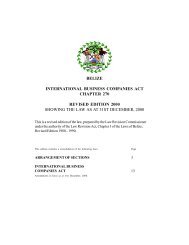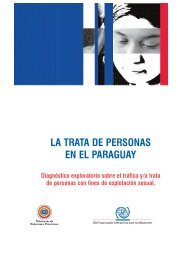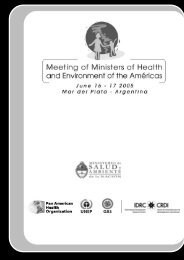The right of access to information Special Rapporteurship for ... - OAS
The right of access to information Special Rapporteurship for ... - OAS
The right of access to information Special Rapporteurship for ... - OAS
Create successful ePaper yourself
Turn your PDF publications into a flip-book with our unique Google optimized e-Paper software.
OFFICE OF THE SPECIAL RAPPORTEUR FOR FREEDOM OF EXPRESION<br />
INTERAMERICAN COMMISSION ON HUMAN RIGHTS<br />
ORGANIZATION OF AMERICAN STATES<br />
REPORT 2009<br />
<strong>of</strong> persons who manage public services and utilities or public resources; <strong>in<strong>for</strong>mation</strong> that the<br />
State receives, or is required <strong>to</strong> collect in the course <strong>of</strong> conducting its duties; and <strong>in<strong>for</strong>mation</strong><br />
concerning one’s own personal data (habeas data) or assets, in the possession <strong>of</strong> those who<br />
administer private registries or databases and are legally required <strong>to</strong> provide it.<br />
6. Obligations imposed upon the State by the <strong>right</strong> <strong>of</strong> <strong>access</strong> <strong>to</strong> <strong>in<strong>for</strong>mation</strong><br />
17. <strong>The</strong> <strong>right</strong> <strong>of</strong> <strong>access</strong> <strong>to</strong> <strong>in<strong>for</strong>mation</strong> held by the State generates several obligations<br />
under the American Convention <strong>for</strong> the authorities <strong>of</strong> the various branches <strong>of</strong> government.<br />
18. First, the State is under the obligation <strong>to</strong> respond substantially <strong>to</strong> requests <strong>for</strong><br />
<strong>in<strong>for</strong>mation</strong> within a reasonable period <strong>of</strong> time, determining whether there is a <strong>right</strong> <strong>to</strong> <strong>access</strong> and,<br />
if so, providing the <strong>in<strong>for</strong>mation</strong> requested. Indeed, by protecting the <strong>right</strong> <strong>of</strong> individuals <strong>to</strong> <strong>access</strong><br />
<strong>in<strong>for</strong>mation</strong> held by the State, article 13 <strong>of</strong> the American Convention establishes a positive<br />
obligation <strong>for</strong> the State <strong>to</strong> provide such <strong>in<strong>for</strong>mation</strong>, in such a manner that the person is able <strong>to</strong><br />
obtain and know this <strong>in<strong>for</strong>mation</strong>, or be in<strong>for</strong>med through a well-founded response <strong>of</strong> the<br />
legitimate reasons that prevent such <strong>access</strong> in accordance with the Convention. 7 On this point,<br />
the Inter-American Commission has also held that the law must guarantee broad and effective<br />
<strong>access</strong> <strong>to</strong> public <strong>in<strong>for</strong>mation</strong>, and that any exceptions may not confer an excessive degree <strong>of</strong><br />
discretion upon the public <strong>of</strong>ficials who decide whether or not <strong>to</strong> disclose the <strong>in<strong>for</strong>mation</strong> 8 , that is<br />
<strong>to</strong> say, exceptions “must have been established by law <strong>to</strong> ensure that they are not at the<br />
discretion <strong>of</strong> public authorities” 9 .<br />
19. In other words, States have the obligation <strong>to</strong> provide individuals with an<br />
administrative procedure <strong>for</strong> <strong>access</strong>ing <strong>in<strong>for</strong>mation</strong>. Such procedure must be established by law.<br />
It must provide reasonable time periods within which the authorities shall decide, in a reasoned<br />
manner, whether there is a <strong>right</strong> <strong>to</strong> <strong>access</strong> <strong>to</strong> the <strong>in<strong>for</strong>mation</strong>, whether the authority <strong>to</strong> which the<br />
request <strong>for</strong> <strong>access</strong> was made is authorized <strong>to</strong> provide said <strong>in<strong>for</strong>mation</strong>, and if not, it must indicate<br />
the proper agency. This duty <strong>to</strong> establish an administrative procedure <strong>for</strong> <strong>access</strong> <strong>to</strong> <strong>in<strong>for</strong>mation</strong> is<br />
the necessary consequence <strong>of</strong> the inclusion <strong>of</strong> the <strong>right</strong> <strong>to</strong> <strong>access</strong> <strong>to</strong> <strong>in<strong>for</strong>mation</strong> as a human <strong>right</strong><br />
protected by the Convention and covered by all <strong>of</strong> the guarantees provided therein. Likewise, as<br />
is further explained in detail, States must establish the <strong>right</strong> <strong>to</strong> judicial review <strong>of</strong> the administrative<br />
decision through a simple, effective, rapid, and unburdensome recourse that allows the<br />
contravention <strong>of</strong> the decisions <strong>of</strong> those public <strong>of</strong>ficials who deny the <strong>right</strong> <strong>of</strong> <strong>access</strong> <strong>to</strong> some<br />
specific <strong>in<strong>for</strong>mation</strong>, or who simply fail <strong>to</strong> provide a response <strong>to</strong> the request. 10<br />
20. As stated by the UN, <strong>OAS</strong> and OSCE <strong>Special</strong> Rapporteurs on Freedom <strong>of</strong><br />
Expression in their Joint Declaration <strong>of</strong> 2004, “[a]ccess <strong>to</strong> <strong>in<strong>for</strong>mation</strong> is a citizens’ <strong>right</strong>. As a<br />
result, the procedures <strong>for</strong> <strong>access</strong>ing <strong>in<strong>for</strong>mation</strong> should be simple, rapid and free or low-cost.” In<br />
the words <strong>of</strong> the Inter-American Juridical Committee, in its “Principles on the Right <strong>of</strong> Access <strong>to</strong><br />
In<strong>for</strong>mation”, “[c]lear, fair, non-discrimina<strong>to</strong>ry and simple rules should be put in place regarding<br />
the processing <strong>of</strong> requests <strong>for</strong> <strong>in<strong>for</strong>mation</strong>. <strong>The</strong>se should include clear and reasonable timelines,<br />
provision <strong>for</strong> assistance <strong>to</strong> be given <strong>to</strong> those requesting <strong>in<strong>for</strong>mation</strong>, free or low-cost <strong>access</strong>, and<br />
does not exceed the cost <strong>of</strong> copying and sending the <strong>in<strong>for</strong>mation</strong>, and a requirement that where<br />
7 I/A Court H.R., Case <strong>of</strong> Claude Reyes et al. v. Chile. Judgment <strong>of</strong> September 19, 2006, Series C No. 151.<br />
Para. 77. IACHR, Arguments be<strong>for</strong>e the Inter-American Court <strong>of</strong> Human Rights in the Case <strong>of</strong> Claude Reyes et al. v.<br />
Chile, cited in the Judgment <strong>of</strong> September 19, 2006, Series C No. 151. Para. 58. a) y b).<br />
8 IACHR, Arguments be<strong>for</strong>e the Inter-American Court <strong>of</strong> Human Rights in the Case <strong>of</strong> Claude Reyes et al. v.<br />
Chile, cited in the Judgment <strong>of</strong> September 19, 2006, Series C No. 151. Para. 58 d).<br />
Para. 89.<br />
9 I/A Court H.R., Case <strong>of</strong> Claude Reyes et al. v. Chile. Judgment <strong>of</strong> September 19, 2006, Series C No. 151.<br />
10 I/A Court H.R., Case <strong>of</strong> Claude-Reyes et al. Merits, Reparations and Costs. Judgment <strong>of</strong> September 19,<br />
2006. Series C No. 15, par. 137.


